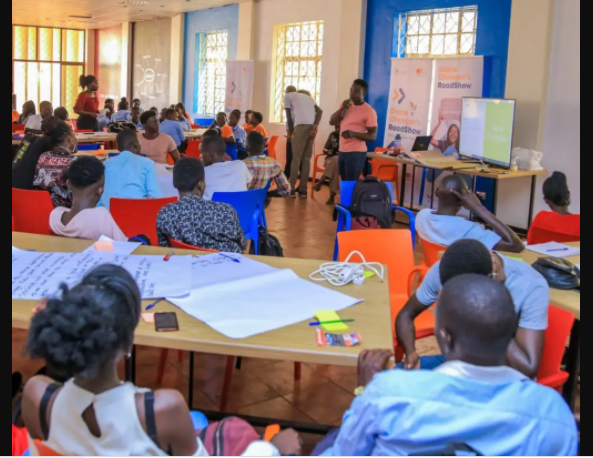In 1999, the United Nations General Assembly declared August 12, as the International Youth Day to celebrate the involvement and contributions of the young people to the national development agenda, while drawing attention to the day-to-day challenges they face in pursuing their dreams and aspirations to live a decent life free from poverty, unemployment, inequality and exclusion.
Uganda is ranked as one of the countries with the most youthful population in the world, with 78 percent under the age of 30 years, according to the State of Uganda Population Report, 2018. This represents a significant development potential of the young people.
Celebrated under the theme Transforming Food Systems: Youth Innovation for Human and Planetary Health. This year ‘s International Youth Day provides us with the opportunity to recognize the roles of young people in transforming national outcomes of the food production process, nutrition, security and health.
Agnes Kirabo, the Executive Director for the Food Rights Alliance defines food systems as the journey that food makes right from the point of production until it enters the human system. Kirabo says that they are referred to as systems rather than chains because of the multiple actors that participate in this process. Ultimately everyone is an actor and everyone is concerned with the food system depending on whether they are a producer or a consumer.
Young people are often criticized for neglecting agriculture. The Uganda Bureau of Statistics, 2000 estimates that only 29 percent of the youth work in subsistence agriculture and yet in Kirabo’s view as the largest consumers in the food system, their participation is crucial for its sustenance.
Owing to the complexity of the food system that requires a lot of facilitation in production, processing, transportation and consumption because of the varying needs and complexity that often goes unmet, Kirabo urges the youth to plug in at any point with solutions. “Sometimes there is production and a matching need, and yet these don’t always intertwine because of various challenges,” Kirabo says.
Kirabo opines that if the youth build strong market linkages, they can connect these entities especially using digitization. In her observation the youth are not bashful about adopting new technologies in which they get savvy very fast. The youth’s gravitation to these new and nifty gadgets is a talent they can explore to improve the Ugandan food system which is still lacking in the area of digital technology.
Food systems touch every point of human existence and there are numerous opportunities for the youth to join and gain. Health and food systems are intertwined and the current trends are leaned toward healthy and organic foods, balanced and nutritious foods to deal with health challenges like obesity. A report by the United Nations Food systems summit, 2021 indicates that 22 percent of Ugandan populations are overweight.
“Another existing problem to solve is food wastage caused by bumper post-harvest handling of foods with short shelf life. Uganda loses 40 percent of food harvest to diseases, rot and pests in the production and processing chain due to poor post- harvest handling and storage. These are golden opportunities for the youth to innovate with effective technologies and create cottage industries to resolve the issue.”
Whatever way the youth choose to plug in, Kirabo says that they should know that they have a moral obligation to innovate around food systems in a way that encourages safe food consumption, food security and production to promote health and sustainability for the planet.
Statistics accrued from The Village database reflect a total reach of startups and entrepreneurs innovating in agriculture at just 6%, the highest within the establishments reach and yet still very low. The health sector accounts for only 0.9 percent out of a total reach of 14,281 start-ups and entrepreneurs operating in different sectors.
“Innovation is work, turning challenges into opportunities is work.” Money follows ideas and not vice versa, and so rather than clamour for funds, the youth should throw themselves into ideation. Like Kirabo hopes for, some youth are hard at work with. Innovating in this crucial sector of Agriculture and one of the promising ones is Famunera.
Famunera is a startup in the food system that bridged the gap created by COVID-19 pandemic restrictions in the first lockdown. With a base of 20,000 farmers using Famunera’s digital innovation, right from Kampala to the remotest areas in the country. The startup ensures that farmers have access to quality inputs conveniently through its various digital platforms including websites and USSD code.
Participating in the COVID-19 relief fund set up by The Innovation Village, Famunera emerged as one of the winners with a $10,000 (about Shs36 million) cash prize. Famunera’s founder Enock Naika says that these funds went a long way in enabling the company’s growth. “We have seen the farmer numbers increase significantly from 500 to 20,000 after partnering with The Innovation Village, ” Naika said. Through the guidance of the Future Lab at The Innovation Village, there are efforts to ensure that young innovators like Naika do not walk the journey of transforming the agriculture sector alone.
Under the stewardship of Samantha Niyonsaba, the Future Lab is doing its part to transform the food system by creating a vibrant digital Agri-preneurship space in various ways through its Agtech Lab. The Lab works with corporate partners and farmers to identify challenges affecting the agriculture sector, innovate the right digital tool to support and mitigate the challenges. Also, the Lab accelerates these businesses to the next level of growth as seen in the 2018 Innovate for Agriculture Challenge and 2020 COVID-19 Relief Challenge.
Up to date, Futurelab has been able to reach 105 start-ups operating in food and agriculture and 76 start-ups operating in the health sector. These startups account for 23.6% and 17.2% of both sectors respectively out of the total number of startups the FutureLab works with.
Niyonsaba believes that while the youth are important in the struggle to transform food systems towards sustainability, it will take joint efforts from the entire ecosystem and its various stakeholders to ensure that they are successful. As The Innovation Village, Niyonsaba says we strive to ensure the youth get all the support they need across all sectors to become employable, get the right skills and make a decent living in efforts to transform society.





